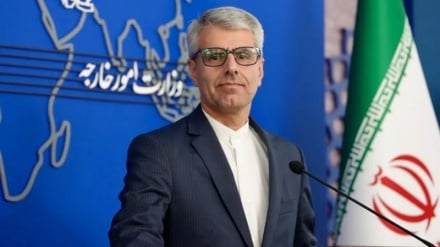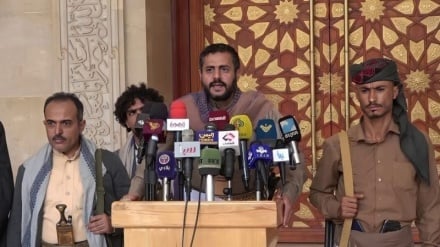It's time to stop Saudi-made mayhem in Yemen
The effects of the Saudi-led war and blockade are having a dramatic impact on humanitarian situation and health care in different parts of Yemen.
According to international aid groups, “medicines can't be brought in, so patient care is falling apart. Fuel shortages mean equipment doesn't work. It's a terrible downward spiral that puts thousands of lives at risk." The humanitarian situation is nothing short of catastrophic. The world needs to wake up to what is going on. Yemen is crumbling. As a matter of urgency, there must be free movement of goods into and across the country. Deliveries of food, water and medicine should be facilitated. Minds need to be focused to find a political solution - and quickly. Simply put, the Saudis don’t let this happen.
Nevertheless, the need for greater public awareness only increases as the unnecessary conflict deepens and expands to new areas. While the tragedy is reflected in much of the country’s new reality, another worrisome consequence grips the young children of Yemen. Some are coerced into fighting; others are either martyred in airstrikes or driven by social, economic, political or other motives to take up guns. Sometimes it is a complex combination of all these, but the end result is the same in any case: Children are dying.
The horror stories are easy to find in most parts of the country, where families, many of them displaced, can barely cope with the astronomical prices for basic amenities like food and fresh water, and the long queues to purchase a few liters of fuel, if they are lucky. If humanitarian relief doesn’t reach these families soon, the tragic stories will have many tellers and many more takers, but very few actors remaining to play their parts. For today, Yemen’s children stand scarred but resolute. They wait wearily in their dilapidated neighborhoods, hoping to emerge from the rubble and return to their schools once again – once the US-backed, Saudi-led war ends. As is, the war has created a humanitarian and political catastrophe. Since Saudi Arabia invaded the country in March 2015, the conflict has spiraled into an open, multiplayer regional war that has claimed the lives of more than 17,000 people. For long stretches, Yemen’s seaports have been blockaded by the Saudi regime and its cohorts, threatening the food supply of an estimated half of the population of 24 million. Meanwhile, the number of displaced has lurched upward to several millions.
The conflict marks yet another unfortunate escalation in the region that will exacerbate security problems and political divisions. This time around, certain Arab regimes and the United States should end their airstrikes before Yemen becomes another intractable killing field.
Regional governments and multilateral organizations ought to take every conceivable diplomatic step available today to address the crisis. Otherwise, it could quickly turn into another Syria, an intractable, grinding conflict that destroys one nation, while implicating a raft of others in a conflict that has no good possible outcomes. US support has emboldened the Saudi-led coalition in the conflict, and almost all members are already pursuing military options, including the UAE. Meantime, Yemen’s resistance factions fight the Saudi-led invaders, Al-Qaeda in the Arabian Peninsula (AQAP) and Daesh resolutely. The crisis poses many dangers. The most obvious is in Yemen itself, where starvation has become endemic and an avoidable escalation of war could lead to a mass humanitarian tragedy. Security blowback is an equally intense strategic concern. AQAP has been one of the most active groups plotting international terrorist attacks, including against the border regions. The US-backed Saudi airstrikes directly empower the terrorist groups and increase the threat to the entire region.
The war also has clear ramifications for its direct neighbors. Since March 2015, Saudi Arabia, acting out of a foreign policy that seeks expanding influence, has embarked on a so-called coalition air war that has no discernible end game. Developments in Yemen are indeed linked to Saudi efforts to deepen their presence in the poorest country in the region. Critics paint the Saudi invasion as impulsive and slipshod and point out that Riyadh could not persuade the UN Security Council to endorse its illegality, let alone continue the war without the much-needed US support.
The Saudi coalition efforts have now backfired. With the Ansarallah Movement and the revolutionaries now inching closer to a clear military victory in Sana’a, the chances of a negotiated end of the war have shrinked further. With the revolutionaries being now more powerful than they were before, the Saudis are not going to engage in negotiations with them, at least at this stage. Their preferred position will be to strike them hard as a means to force them into submission and accept the Saudi hegemony. But chances of doing this are bleaker than ever.
According to the latest reports, for last several days, Yemen’s southern separatists have been battling their estranged partners — forces loyal to ousted President Hadi. The fighting taking place in the important city of Aden has not only exposed how fragile the whole Saudi Yemen project is, but also that Yemen remains best by its historical grievances, which the Saudi coalition’s money and weapons has failed to redress and bridge. One of the primary reasons for this infighting, according to reports, is the stark inability of the Hadi government to improve the lives of the Yemeni southerners. On wider scale, the in-fighting has also exposed strategic and policy differences between Saudi Arabia and the UAE.
With UAE being the chief sponsor of southern separatists, and Saudi Arabia being the main sponsor of the deposed fugitive president Hadi, the clash is much more than just local fight between two groups; it does also reflect how differences have started to emerge and leave an impact on a war that both countries have spent—and wasted– billions in.
More than anything else, at the moment, the southerners have revolted against the Saudi supported forces. It is time for the so-called Saudi-led coalition to worry and do a re-think because this in-fighting, if it spreads, will do an irreparable damage to their interests that have already been established on killing and destruction of the impoverished Arab nation.
Doubtless, the US-backed, Saudi-made humanitarian crisis in Yemen has strained an already bad security climate. The current historical moment offers an opportunity for the United Nations and the international civil society to deploy diplomatic influence in a concerted and sustained manner. They are in the know that now is the time to force the Saudis to end their protracted war on Yemen and allow its people to determine their own future.
At least 13,600 people have lost their lives since the onset of Saudi Arabia’s military campaign against Yemen in 2015. Much of the country's infrastructure, including hospitals, schools and factories, has been reduced to rubble due to the war. The Saudi-led war has also triggered a deadly cholera epidemic across Yemen. According to the World Health Organization’s latest tally, the cholera outbreak has killed 2,167 people since the end of April 2017 and is suspected to have infected 841,906.
In November 2017, the United Nations children’s agency, UNICEF, said more than 11 million children in Yemen were in acute need of aid, stressing that it was estimated that every 10 minutes a child died of a preventable disease there. Additionally, the UN has described the current level of hunger in Yemen as “unprecedented,” emphasizing that 17 million people were food insecure in the country. The world body says that 6.8 million, meaning almost one in four people, do not have enough food and rely entirely on external assistance.
What you heard and read was a brief analysis of the ground realities in Yemen; that was complemented by excerpts from an article by Salman Rafi Sheikh, a research-analyst of the International Relations and Pakistan’s foreign and domestic affairs.
EA/ME


